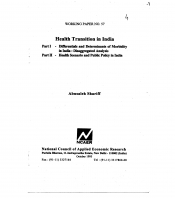Health Transition in India
Abusaleh Shariff
October 1995
NCAER from time to time publishes working papers reporting the most recent research focus of the faculty members, based on the ongoing projects as well as their independent research. This working paper titled ‘Health Transition in India’ consists of papers recently written by Abusaleh Shariff, the Principal Economist and Head of the Human Development Research Area at the NCAER.
The first essay entitled ‘Differentials and Determinants of Morbidity in India : Disaggregated Analysis’ is an empirical analysis of survey data collected from 18,693 households across India. This survey was carried out during the summer months of May-June 1993. It is well recognized that NCAER is unique in collecting data through nationally representative sample surveys on morbidity and health expenditures. The survey cited above was the second in the series. The first survey was undertaken during May-July 1990. Another set of data will become available soon through a survey of 37,000 households conducted during January-May 1994. I am sure that, this essay and the subsequent analysis of the available data at the NCAER will help generate interest and develop policy alternatives underscoring the importance of morbidity studies in the context of human resources development in India.
The second paper is a critical essay on the health scene in India and the role of public health policy. In the light of the need to improve the health care of the millions living in poverty, and in rural and remote areas, this paper pleads for a re-definition of the concepts of ‘health care’ and ‘accessibility’. Supply of appropriate health care seems to remain a distant dream in India and, therefore, urgent corrective actions are in order.
Human Development and Data Innovation







